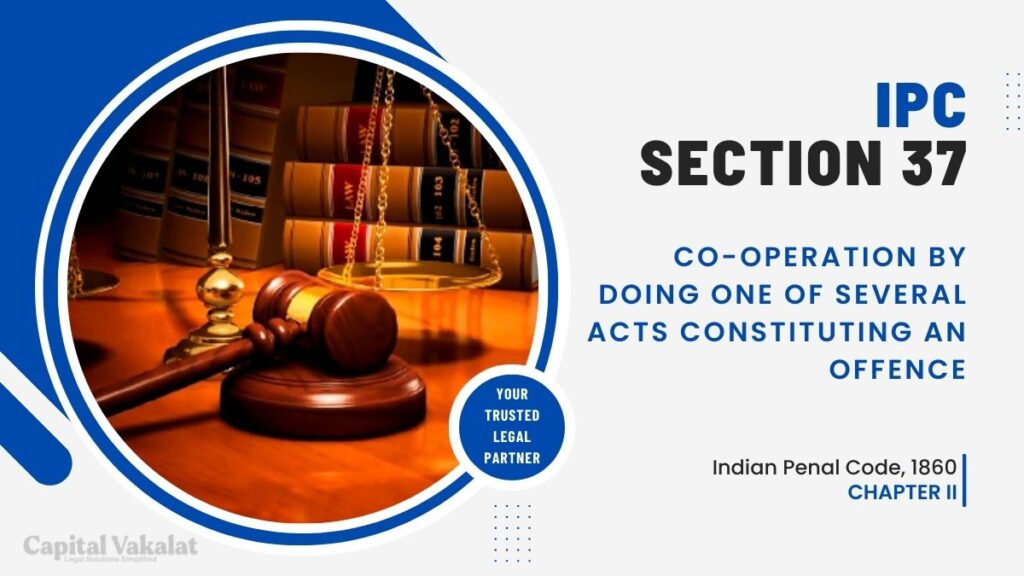In the realm of criminal law, the concept of co-operation in the commission of an offence plays a pivotal role. Section 37 of the Indian Penal Code (IPC) addresses the intricate aspects of co-operation when multiple individuals are involved in committing a criminal act. This section sheds light on the legal consequences that ensue when individuals participate in the execution of an offence, each contributing distinct acts that together lead to the commission of the crime.

Section 37 of the IPC deals with situations where multiple individuals work together to commit an offence. It’s crucial to understand the implications of this section in order to comprehend the shared responsibility and legal consequences for such collaborative acts.
Understanding Section 37 IPC
Section 37 specifically addresses cases where multiple individuals are involved in committing a criminal offence. The section states that when an offence is committed by a number of persons, each of them can be held liable for that offence as if it were done by them alone.
The Elements of Co-operation
Types of Co-operative Acts
Co-operative acts can take various forms, such as aiding, abetting, assisting, or facilitating the commission of the offence. These acts might not be identical, but they are interlinked in their contribution to the ultimate crime.
Shared Criminal Intention
For Section 37 to apply, there must be a shared intention among the individuals involved to commit the crime. Mere presence at the scene of the crime is not sufficient to establish guilt under this section; active participation and shared intention are crucial.
Liability and Punishment
Individual Liability
Each individual involved can be held fully liable for the entire offence. This means that even if one person’s contribution seems minor, they can still be treated as a principal offender under the law.
Collective Consequences
The collective actions of all co-accused individuals are taken into consideration while determining the consequences. Sentencing and punishment are based on the overall gravity of the crime and the roles played by each participant.
Landmark Cases
Landmark cases have played a significant role in shaping the interpretation and application of Section 37 IPC. These cases provide insights into the nuanced understanding of co-operation in criminal offences.
Importance in Criminal Justice
Section 37 serves as a deterrent against individuals evading responsibility by pointing fingers at each other. It ensures that the law can effectively hold all participants accountable for their role in the offence.
Comparative Analysis
Co-operation vs. Conspiracy
Co-operation and conspiracy are distinct concepts. While co-operation involves participation in the actual commission of the crime, conspiracy relates to an agreement to commit an offence. Both aspects have their own legal implications.
Co-operation vs. Abetment
Abetment involves encouraging, aiding, or facilitating the commission of an offence. While similar to co-operation, abetment generally doesn’t require direct participation in the crime itself.
Challenges and Controversies
The application of Section 37 has raised various challenges, including determining the extent of each individual’s involvement and establishing a shared intention.
The Evolution of Section 37 IPC
Over time, the interpretation of this section has evolved through judicial pronouncements, adapting to changing societal and legal dynamics.
Role of Mens Rea
Mens rea, or the guilty mind, is a crucial factor in co-operation cases. Establishing the mental state of each individual is essential to prove their involvement.
Judicial Interpretations
Courts have provided vital insights into the interpretation of Section 37, highlighting the need for substantial connection between co-accused individuals and the crime.
Balancing Individual Actions
The law aims to strike a balance between holding individuals accountable for their actions while avoiding unjust or excessive punishment.
Ensuring Fair Trials
Ensuring fair trials in co-operation cases involves addressing issues of evidence, burden of proof, and protecting the rights of the accused.
Public Policy Considerations
Public policy plays a role in shaping the application of Section 37, particularly in cases where one participant might be more culpable than others.
Conclusion
Section 37 IPC addresses the complexity of co-operation in criminal offences. It ensures that all individuals involved in committing an offence are held accountable, irrespective of the extent of their participation. This provision underscores the importance of shared responsibility and collective consequences in the realm of criminal law.
Certainly, here are some external resources that provide detailed information about Section 37 IPC and related concepts:
- Understanding Section 37 IPC – This article provides an in-depth analysis of Section 37 IPC, explaining its implications and legal nuances.
- Co-operation vs. Conspiracy – Explore the differences between co-operation and conspiracy in criminal law, helping you grasp the distinctions.
- Indian Kanoon – Landmark Cases on Section 37 IPC – Search and access landmark cases that have shaped the interpretation of Section 37 IPC and related legal principles.
Remember to verify the credibility of these resources before relying on them for legal research.
FAQs
Is mere presence at the crime scene enough to establish guilt under Section 37?
No, mere presence is not enough. Active participation and shared criminal intention are key factors for liability.
How does Section 37 differ from abetment?
Section 37 deals with direct co-operation in the commission of an offence, while abetment involves aiding or encouraging the offence.
Can an individual be held liable under Section 37 for a minor contribution to the offence?
Yes, even a minor contribution can render an individual liable under Section 37 if there is shared criminal intention.
What role does mens rea play in co-operation cases?
Mens rea, or the mental state, helps establish an individual’s culpability and intention in co-operation cases.